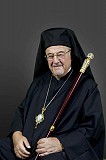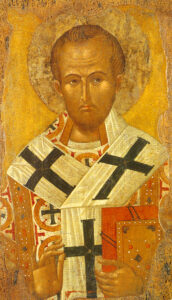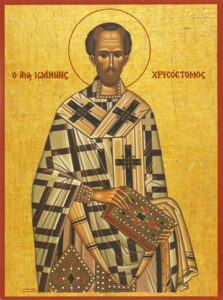A Meandering * Introduction
 Did you know that word came from the Meander (now “Menender”) River in Asia Minor which meanders its way toward the Aegean Sea, and this is it:
Did you know that word came from the Meander (now “Menender”) River in Asia Minor which meanders its way toward the Aegean Sea, and this is it:
So now you’re prepared for what follows.
This morning my wife asked me what I’ll write about in the Blog this week. I answered “The Nativity Fast – unwillingly”. That’s what I promised to talk about today, though I haven’t done it yet, but I guess I should.
Now, let me say clearly: I do not like the Nativity Fast. That is why I’ve never written about it before and have put off doing it this week, so that even now as I write, this article is still scarcely outlined in my mind.
Yesterday at this time it was in the 70s and sunny – unheard of in Wisconsin in November! I didn’t work on this Post because I was finishing up my fall outdoor chores, which I should have finished a long while ago. (I put that off, too.)
Let me stop and tell you about this autumn in Wisconsin, 
 which has been superbly beautiful. We had three long spells of lovely clear warm summery weather – and then two more days’ bonus this week. This was what we used to call “Indian Summer” *. The fall colors this year have been the most gorgeous I’ve ever seen. I’ve just got to share with you these two pictures I took from our house, using only my little Apple-8 phone. Imagine that in all directions for miles and miles around. Glory be to God! That certainly didn’t make me think of the Nativity Fast.
which has been superbly beautiful. We had three long spells of lovely clear warm summery weather – and then two more days’ bonus this week. This was what we used to call “Indian Summer” *. The fall colors this year have been the most gorgeous I’ve ever seen. I’ve just got to share with you these two pictures I took from our house, using only my little Apple-8 phone. Imagine that in all directions for miles and miles around. Glory be to God! That certainly didn’t make me think of the Nativity Fast.
- I agree that we shouldn’t call it “Indian Summer” any more. I mean, native Americans are not from India, so why should they (and we) get stuck with the, uh… “slight” mistake Christopher Columbus made five centuries ago? Two suggestions for a replacement: 1 In parts of western Europe they call this lovely season Saint Martin’s Summer. The feast of Saint Martin, Bishop of Tours, is November 11. He died while he was away on a pastoral visit, and it is said that at as his body was being taken back to Tours by boat, the weather turned so warm that the trees began to burst into blossom. 2 In rural Greece this is called The Little Summer of Saint Demetrius, whose feast day is October 26 – the time when the flocks were brought down from the hills for the winter. I like this title especially.
Today it has suddenly turned November-y. The temperature is in the 30s and falling. Most of the leaves have likewise fallen, and the trees are left with only bare branches. Surely that should put me in the mood for the Fast, which is now only four days away. But it doesn’t. In fact it made me think of Thanksgiving and family and feasting.
All the above is not because I hate fasting. My wife is a superb cook, and her fasting recipes are so good they almost make me feel guilty. Almost.
But in the thirty three years I’ve been Orthodox, nothing has made me take a shine to this Nativity Fast. Why? Let me take a shot at trying to explain. (Please don’t tell the hierarchs I’ve written what I’m about to write.)
What’s wrong with Orthodox Advent
In my previous life I was accustomed to Western Christian Advent. Granted, they don’t fast before Christmas and haven’t for many centuries now. (Does anyone here present know the story of why they gave up the Advent Fast?) However, Western Advent Sunday worship has a very distinct and thorough-going character to it: Beginning about December 1, all Sunday Scripture readings (Old Testament, Psalms, Epistle, Gospel) and hymns prepare us for the coming of Christ in its several aspects. I loved Western Advent. Now, combine that with Orthodox pre-Christmas Fasting, and we’d have something really powerful.
However, when our Orthodox Nativity Fast begins on November 15, it just sort of hangs out here by itself. Forgive me if I’ve missed something, but I think we hear the first mention of Christ’s coming a week later on November 21 when the beautiful Christmas Canon (“Christ is born. Give Him glory…”) is sung at Matins.
englishorthodoxchants.com
But how many of you are going to be at Matins to hear it? (Be honest, now.)
At Sunday Divine Liturgy in late November (November 27 this year) the lovely Kontakion of Preparation for Nativity (“The Virgin comes today to the cave…” is first sung for the first time.
Father Apostolos Hill (orthodoxchristianchants.com)
But other than that, during early December nothing would in church suggest to Orthodox people that Christmas is coming – except that we’re supposed to Fast. *
- Why is Orthodox Advent so “lacking”? I read that it’s because Orthodox liturgical practices stopped developing early (not a bad thing, on the whole) so that we never got around to Advent, which was a later development in Western Christianity. There it still continues to change: Western Advent today is in many ways not the same as it was when I was young.
Here’s a site which gives some good suggestions about how to make Orthodox Advent come alive in the home:
https://www.asceticlifeofmotherhood.com/blog/Adventguideforfamilies
Our official Orthodox season of Preparation for Christmas doesn’t begin till Vespers on December 19. Finally on the Sunday before the Nativity, the Genealogy of the Ancestors of Jesus Christ from Adam to Joseph is read in the Holy Gospel (Matthew 1:1-25), which continues to tell us that Saint Joseph was no actually His father!
So, in other words, don’t blink or you might almost miss Orthodox Advent… except for the Fast. So that’s what we need to talk about today.
The Orthodox Nativity Fast
That’s the official title. In practice it is sometimes also called the Christmas Fast or the Advent Fast or the Pre-Christmas Fast or even “Christmas Lent”.

In the Ethiopian Orthodox Tewahedo Church and the Eritrean Orthodox Tewahedo Church it’s called the Fast of the Prophets – regarding which, here is an interesting article, well worth reading: https://eotcmk.org/e/the-fast-of-the-prophets-tsome-nebiyat/
What should our Nativity Food Fast consist of? According to the canons it should be exactly like our Great Lenten Fast * Refrain from meat, fish, oil, wine, dairy, and eggs, as any Orthodox calendar tells us.
- P. S. on Saturday: I think I may be wrong about this and have never noticed it all these 33 years! As Father David points out in the comment below, the Greek calendar says fish wine and oil are ok on weekdays except Wednesdays and Fridays. Some say exceptions are made for major holy days. Keep in mind always that we have Orthodox fasting rules/guidelines, not laws. (At our house we never have been strict during Advent, though we do give up meat and reserve fish for Sundays.) And remember: shrimp and lobster (though who can afford it)are not fish!
How many Orthodox people keep the Nativity Fast like that? I have no idea. We have no Orthodox fasting police who go from house to house peeking into our windows at meal times, so they can then come and report to the clergy. You’re on your own, folks. It’s between you and God.
We know Fasts are kept strictly in most monasteries. My guess is that, otherwise, a small minority of American Orthodox keep the Christmas Fast strictly, that most of the rest of us adapt it as needful, and that some of us go along with “the world” and ignore it entirely. That’s just a guess.
Remember that Orthodox fasting rules are “maximalist”. They set the highest goal that we might aim for. We should not feel guilty if, for some reason, we can’t do it all, or if it’s not practical to do so. (For example, I’ve eased up in my old age.) However, Western fasting rules are “minimalist” (these days extremely minimal): “people should do this much at least”.
I heard the true story of a “convert” Orthodox parish whose people didn’t understand this difference, so they strictly kept the maximalist rule which allows only a couple or three meals during Holy Week. These poor people were dropping like flies – involuntary prostrating! Fainting is not a spiritual virtue.
So during Advent do what you think is fitting for your situation. And then quietly do just a bit more.
How to keep the Pre-Christmas Fast when the world around us is celebrating Christmas (or something) all during December
How should we American Orthodox handle Thanksgiving? (I know, you Canadians had  your Thanksgiving Day in late October.) Our late Antiochian Metropolitan Philip (of blessed memory, and not only for this reason!) used to tell people * they should feel free to eat turkey on Thanksgiving. These days Thanksgiving is a sort of “secular” feast day, but it is a wholesome day which brings people together in unity – unless they talk politics! At the table we should be sure to give thanks not only in general (“I’m thankful for…”), but we should specifically give thanks in prayer to Almighty God, for “every good thing given and every perfect gift is from above, coming down from the Father of lights…” James 1:17
your Thanksgiving Day in late October.) Our late Antiochian Metropolitan Philip (of blessed memory, and not only for this reason!) used to tell people * they should feel free to eat turkey on Thanksgiving. These days Thanksgiving is a sort of “secular” feast day, but it is a wholesome day which brings people together in unity – unless they talk politics! At the table we should be sure to give thanks not only in general (“I’m thankful for…”), but we should specifically give thanks in prayer to Almighty God, for “every good thing given and every perfect gift is from above, coming down from the Father of lights…” James 1:17
- Orthodox bishops don’t give legal “dispensations”. Orthodoxy doesn’t function that way.
What should we do if, as is not unlikely, we’re invited to “Christmas” parties during Advent? Quietly try to keep your Advent Fasting rule. But if that isn’t possible, please do not do the “Oh, I’m Orthodox – I can’t eat that” routine… “…do not appear to men to be fasting, but to your Father who is in the secret place; and your Father who sees in secret will reward you openly.” Matthew 6:16-18
Just one more thing: Maybe it would help if I thought of this as the Glad Fast. (There must be a better way of saying that.) Great Lent has a sense of dread hanging over it. We know that before we come to Pascha, we’ll have to walk with our Lord through Holy Week and His death and burial. The Nativity Fast has only a feeling of happy anticipation about it. We prepare by fasting and prayer and repentance to celebrate the coming of Christ in Bethlehem, and also the multitude of ways in which He comes to us now, continually, and will come again in glory at the End of this Age.
The Church gives us these alternating seasons of penitence and celebration for a reason. Don’t ignore them. They do us good.
I began writing article this morning. Now the early darkness of a November evening is upon us, and the temperature is down to 32 and still falling, and I’ve been listening to myself all day, and maybe I’ve convinced myself. For the first time ever I almost feel ready for the Fast.
Saint John Chrysostom on Fasting

† When the fast makes its appearance, like a kind of spiritual summer, let us as soldiers burnish our weapons, and as harvesters sharpen our sickles, and as sailors order our thoughts against the waves of extravagant desires, and as travelers set out on the journey towards heaven. Lay hold of the pathway which leads towards heaven, rugged and narrow as it is. Lay hold of it, and journey on.
† I speak not of such a fast as most persons keep, but of real fasting; not merely abstinence from meats, but from sins as well. For the nature of a fast is such that it does not suffice to deliver those who practice it unless it is done according to a suitable law. So that when we have gone through the labor of fasting we do not lose the crown of fasting, we must understand how and in what manner it is necessary to conduct the business since the Pharisee also fasted, but afterward went away empty and destitute of the fruit of fasting. The Publican did not fast, and yet he was accepted in preference to him who had fasted in order that you may learn that fasting is unprofitable unless all other duties accompany it.
† Fasting is a medicine. But like all medicines, though it be very profitable to the person who knows how to use it, it frequently becomes useless (and even harmful) in the hands of him who is unskillful in its use. For the honor of fasting consists not in abstinence from food, but in withdrawing from sinful practices, since he who limits his fasting only to abstinence from meats is one who especially disparages fasting. Do you fast? Give me proof of it by your works. If you see a poor man, take pity on him. If you see an enemy, be reconciled with him. If you see a friend gaining honor, do not be jealous of him. And let not only the mouth fast, but also the eye and the ear and the feet and the hands and all members of your bodies.
† Let the hands fast by being pure from plundering and avarice. Let the feet fast by ceasing from running to unlawful spectacles. Let the eyes fast, being taught never to fix themselves rudely on handsome faces, or to busy themselves with strange beauties. For looking is the food of the eyes, but if it be such as is unlawful or forbidden, it mars the fast and upsets the whole safety of the soul. But if it be lawful and safe, it adorns fasting. For it would be among things most absurd to abstain from lawful food because of the fast, but with the eyes to touch even what is forbidden! Do you not eat meat? Feed not upon lasciviousness by means of your eyes! Let the ear fast also. The fasting of the ear consists in refusing to receive evil speakings and calumnies. It is written, “You shall not receive a false report” (Exodus 23:1).

† Let the mouth also fast from disgraceful speech. For what does it profit if we abstain from fish and fowl and yet bite and devour the brothers and sisters. The evil speaker eats the flesh of his brother and bites the body of his neighbor. Because of this Paul utters the fearful saying, “If you bite and devour one another take heed that you are not consumed by one another” (Gal.5:15). You have not fixed your teeth in his flesh, but you have fixed your slander in his soul and inflicted the wound of evil suspicion, and you have harmed in a thousand ways yourself, him and many others, for in slandering your neighbor you have made him who listens to the slander worse, for should he be a wicked person, he becomes more careless when he finds a partner in his wickedness. And should he be a just person, he is tempted to arrogance and gets puffed up, being led on by the sin of others to imagining great things concerning himself. Besides this, you have struck at the common welfare of the Church herself, for all those who hear you will not only accuse the supposed sinner, but the entire Christian community….
† And so I desire to fix three precepts in your mind so that you may accomplish them during the fast: to speak ill of no one, to hold no one for an enemy, and to expel from your mouth altogether the evil habit of swearing. For as the harvester in the fields comes to the end of his labors little by little, so we too if we make this rule for ourselves and in any manner come to the correct practice of these three precepts during the present Fast and commit them to the safe custody of good habit, we shall proceed with greater ease to the summit of spiritual wisdom. And we shall reap the harvest of a favorable hope in this life, and in the life to come we shall stand before Christ with great confidence and enjoy those unspeakable blessings of which, God grant, we may all be found worthy through the grace of Jesus Christ our Lord, with whom be glory to the Father, and to the Holy Spirit unto ages of ages. Amen!
from his Homilies on the Statues
Next Week: Bishops who have rightly opposed civil authority
Week after Next: Saint Katherine of Alexandria
Dear Fr Bill,
Thank you so much for this post!
I too miss the Anglican observance of Advent. And the glorious O Antiphons!
https://en.wikipedia.org/wiki/O_Antiphons?wprov=sfti1
I know we don’t change things in the Orthodox Church – but actually we do: new hymns are written for new saints!
Would it be very revolutionary to introduce the O Antiphons instead of the third antiphon before the Little Entrance??
(You’d better not tell my Bishop that I’ve suggested that!! 😉)
re Fasting: The Greek Archdiocese in America produces a Daily Readings app which I have on my ‘phone. It says that up until December 11th (this year) we may have fish, wine & oil (but not on Weds & Fris). Is that a modern (and liberal? 😳) deviation?
And what wonderful teaching from St John Chrysostom! Thank you!
I learn something new, often, from your posts Father Bill. Thank you, again, as I try to apply what you teach.
You’re welcome. I also learn many new things as I research these Posts, and then try to apply them to my life which is not easy.